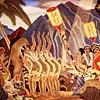 Exotica has never quite grown beyond its initial renaissance ofinterest in the early 90's. Even among its most avid fans andcollectors, it's still considered something of a novelty: mildlydiverting, but ultimately disposable musical kitsch. Recent attempts atresurrecting exotica by John Zorn and Tipsy have been a little tooreverent for their own good - studied facsimiles of 1950's exotica byMartin Denny or Les Baxter - largely academic with zero soul orsincerity.
Exotica has never quite grown beyond its initial renaissance ofinterest in the early 90's. Even among its most avid fans andcollectors, it's still considered something of a novelty: mildlydiverting, but ultimately disposable musical kitsch. Recent attempts atresurrecting exotica by John Zorn and Tipsy have been a little tooreverent for their own good - studied facsimiles of 1950's exotica byMartin Denny or Les Baxter - largely academic with zero soul orsincerity.Hipshot
I've long felt that exotica deserves recognition as one ofpop music's first forays into the integration of cutting-edge studiotechniques, emerging hi-fi stereo effects and cross-genrehybridization. Exotica's melding of crisply reproduced, hi-fidelitycocktail jazz with exotic instrumentation, tribal drumming, oceansounds, bird calls and a galaxy of ambient textures was years ahead ofits time. Not until the dawn of psychedelia did pop music ever againattempt to be this evocative, using the studio as an instrument totransport the listener to other worlds.
Mike Cooper's Rayon Hulais the first truly sincere attempt at 21st century exotica I've comeacross, a cool breeze of an album, experimental but eminentlylistenable. Cooper is a British expatriate, and for the past 40 yearshe has played blues, folk and improv with some of the Britain's bestand brightest. For this album, he turns his attention to the strange,misunderstood world of exotica, specifically the Hawaiian cool jazz ofArthur Lyman. Rayon Hula is billed as a dual tribute to Lyman, the incomparable musician behind classics like Taboo and Hawaiian Sunset,and Ellery Chun, the inventor of the Hawaiian shirt. If the premisesounds dangerously kitschy, the album certainly does not.
Constructedfrom a series of looped samples from Arthur Lyman's records, Cooperoverdubs his own lap steel guitar, electronics and field recordings.The result is a densely layered album, where complex arrangements andgently circulating piano melodies float over off-kilter, irregularrhythms. Care has been taken to arrange all of the elements in aslightly askew fashion, so that accidental convergences occur betweenthe whimsical, hypnotic loops and Cooper's added electronic noises andcurling steel guitar. It's a marvelously under-produced album, as ifCooper knew just when to let go and let the music stand. Noisy, atonalpassages give way to warm, tropical rushes of melody. Backwards-trackedmemories cycle through forgotten vacation photographs of lei makers,coconut stands, midnight luaus with synchronized hula dancers gesturingon the blue sand shores of the Pacific.
It's a shame that Cooper'sHipshot Records has no distribution to speak of. To buy the album, Ihad to send cash to Cooper at his home studio in Rome and waitpatiently for the CD-R to arrive in its flimsy Photoshop sleeve. It'struly a DIY operation, but Rayon Hula is the first entirely rewarding work of modern exotica, so it's more than worth the wait.
Read More

